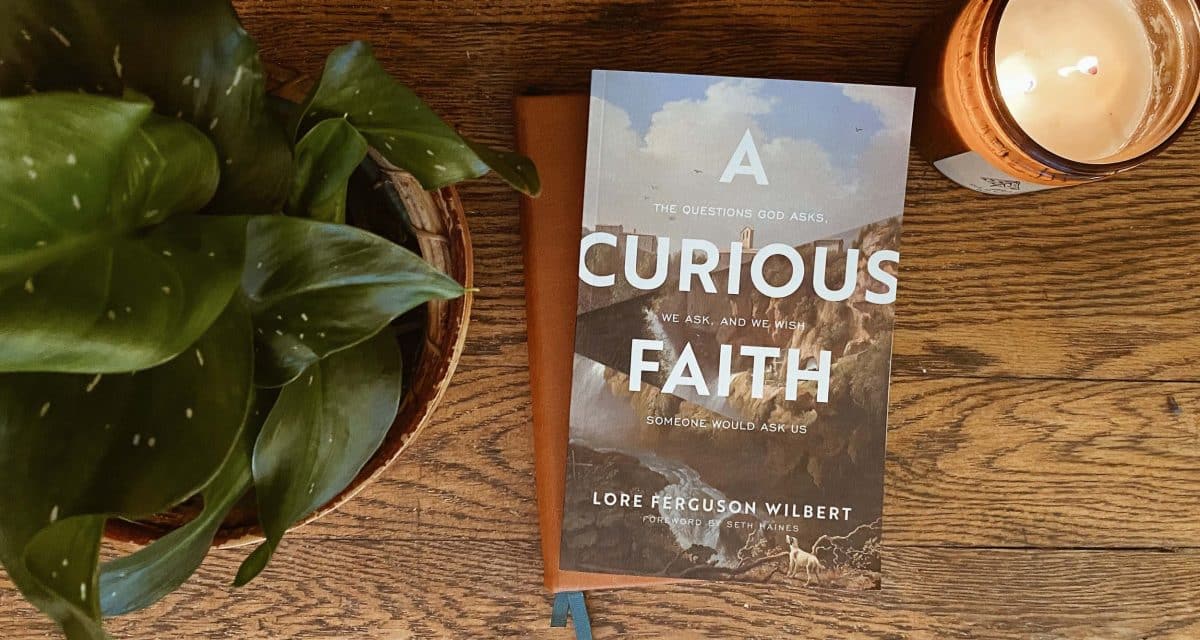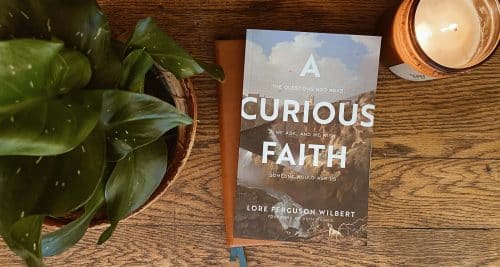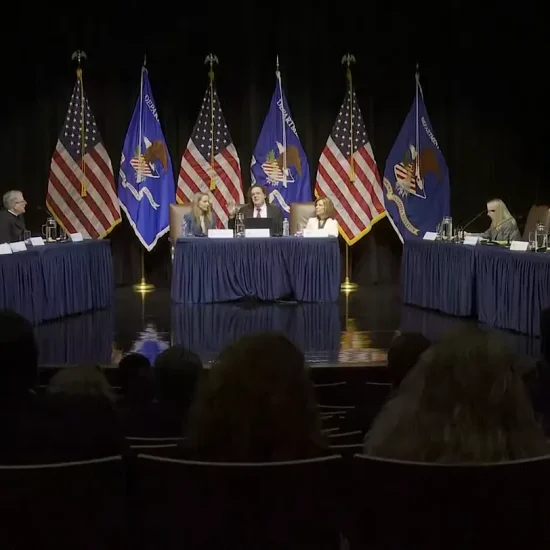

A CURIOUS FAITH: The Questions God Asks, We Ask, and We Wish Someone Would Ask Us. By Lore Ferguson Wilbert. Foreword by Seth Haines. Grand Rapids, MI: Brazos Press, 2022. 190 pages.
Years ago, Tom Skinner wrote a book titled If Christ Is The Answer, What Are The Questions? He wrote in response to a message some were proclaiming back in the day that suggested Jesus was the answer to every question. He wanted to push people deeper, especially since some of the questions he was raising had to do with race and civil rights. Strangely we’re still talking about many of the same concerns, including race and civil rights. While those questions remain with us, there is a lot of talk these days about deconstruction and doubt when it comes to the faith journey.

Robert D. Cornwall
For many Christians, perhaps especially among younger generations, deconstruction has become an important process because their faith has proven faulty or problematic. Truth be told most of us will go through a deconstruction stage. I know that I did, even if it doesn’t seem to be as traumatic in my case as it appears to be for others. In any case, once one has entered the process of deconstruction, what will emerge at the other end of the process? What will you put in place of the faith that you have deconstructed? I suppose I might ask an additional question: Will that new faith profession have to be deconstructed? Perhaps there is another pathway that includes some form of deconstruction, but more likely involves curiosity. Might we embrace the path embraced by St. Augustine among others that speaks of faith seeking understanding? In this process, the focus is on continually asking questions. This pathway, according to Lore Ferguson Wilbert involves embracing A Curious Faith.
A Curious Faith is the product of an effort undertaken by Lore Ferguson Wilbert, a blogger and writer at Sayable.net. She is the author of the book Handle with Care: How Jesus Redeems the Power of Touch in Life and Ministry (B&H, 2020), which won a 2021 Christianity Today book award. She has also written for several journals and magazines. She lives in upstate New York and is part of an Anglican church. I should note that when one identifies as part of an Anglican Church, that usually means the Anglican Church in North America and not the Episcopal Church USA. Thus, she would be part of an evangelical version of the Anglican tradition.
I think it’s helpful to note upfront that Wilbert writes from a fairly traditional theological perspective. As such, she’s not so much a deconstructionist and a doubter as she is a person who simply wants to understand the faith that has sustained her and encouraged others as they have taken their journey of faith. Thus, you won’t find anything radical here. At the same time, Wilbert writes with a rather open, should I say curious, mindset. Thus, her opening chapter, which falls under Part One, carries the title “Living the Questions.” While that doesn’t exactly ring with deconstructionism, it does involve a bit of doubt since asking questions means you don’t have all the answers.
Wilbert writes in her opening chapter, “Living the Questions,” that she grew up in a context where the Christian faith was “more behavior modification and moralism than it was abundant life.” As she experienced this version of Christianity, she looked for certainty. She didn’t find that sense of certainty until she encountered a word from Maria Rilke that invited her to “Live the questions.” She might not have found certainty, but she did find “safety and security in spaces where my questions were welcomed, and my doubts not judged. But I also found friendship with God, security in him, and hope in me.” (pp. 17-19). She speaks of this process of curiosity and asking questions as a spiritual discipline in which we can inspect “our lives, our faith, our friendships, our friends, our churches, our communities, and God himself” (p. 25). The subtitle of the book describes the trajectory the book takes. As the subtitle suggests, she divides the book into three parts.
Part One focuses on “The Questions God Asks.” Yes, God has questions for us, which invite us to live curiously. While the opening chapter of Part One serves as a kind of introduction to the rest of the book, over the remaining eleven chapters in this section she invites us to explore eleven questions. The first question in the section takes us to Genesis 3, where God asks Adam and Eve: “Where are you?” The concluding question takes us to Jonah 4, where she invites us to consider the question: “Is It Right for you to be angry?” In between these two questions we hear God ask us what we’ve done (Gen. 3), where we’re going (Gen. 16), what is your name (Gen. 32), what is in your hand (Exodus 4), what are you doing here (1 Kings 19), where were you when I created all this (Job 38-39), will you correct me (Job 40), and finally, whom shall I send? (Isa. 6).
Having invited us to live curiously by listing to God’s questions, in Part Two, she points us to the questions that we ask of God. The point here is that by asking questions of God we can listen curiously to God’s answers. With that in mind, Wilbert explores eight questions, beginning with the question of why we are born—Jeremiah 20 (chapter 13). In this section, as with Part One, the scripture passages that evoke questions are drawn from the Old Testament. After the question of why we are born, we ponder questions such as where God is at and how we can be right with God. The section ends with a question from Habakkuk 1: “Why do you make me look at injustice?” The answer is: We must look so we can see how God undoes injustice. I’m not sure that works well for me, but it is the answer given to Habakkuk.
Finally, in Part Three, which Ferguson interestingly titles “Questions We Wish Someone Would Ask Us: Loving Curiously,” she speaks to questions asked by those who seek to emulate Christ. The twelve chapters in this section are all drawn from the Gospels, beginning in John 1 with the question “What Are You Looking For? This is the question Jesus asked of those who drew close to him after his baptism in John 1. These folks answer Jesus with a question of their own, “where are you staying?” Here is an invitation to be honest with God about what we as Christians want from God. She notes that the process here of deconstructing and reconstructing involves not only our minds but our hearts. Here is an invitation to pursue the integration of our faith into our entire lives. As she moves us through the questions we ought to ask of each other by reflecting on passages from the Gospels, she brings the conversation to a close with a reflection from John 21 on the question Jesus asked Peter: “Do you love me?” Here she writes about a faith that centers on one’s love of God. She writes, helpfully, that “God is not interested in followers with all the right answers or even the right questions. He wants us to ask the questions, whatever kinds of questions we want, to lead us right to the locus of his love” (p. 182).
As one who has been on a journey that has taken me many places within the Christian faith (see my book Called to Bless: Finding Hope by Reclaiming Our Spiritual Roots, Cascade Books, 2021), I welcome Ferguson’s invitation to engage in A Curious Faith. Shouldn’t that be the way things are for us? Is this not the path of faith seeking understanding? Is this not a life-long journey? So far, that has been true for me. I expect it to continue, as God asks questions of me, I ask questions of God, and others ask questions of me. Each of these pieces of the puzzle helps us develop our understanding of God, ourselves, and creation itself. So, yes, I believe that we are better off if we continually pursue the questions that deepen our faith in God. It’s not always easy, because it can require us to let go of easy answers, but in the end, we are better for it. While Lore Ferguson Wilbert writes from a pretty stable evangelical perspective, she is open to learning new things by asking and listing to faith questions. In her quest for certainty, she found a place of security and safety that allows for questions to be asked. Should not that be true of us all? Let us, therefore, embrace curiosity!
Note: I need to add that I wrote this review based on reading an advanced reading copy that was provided by the publisher (Brazos Press). That means I don’t have the exact page numbers available to me, though I’m assuming that they will be largely the same when the book is published in August 2022. It is, however, as I write this review, available for preorder.
This review originally appeared on BobCornwall.com.
Robert D. Cornwall is an ordained minister in the Christian Church (Disciples of Christ). Now retired from his ministry at Central Woodward Christian Church (Disciples of Christ) of Troy, Michigan, he serves as Minister-at-Large in Troy. He holds a Ph.D. in Historical Theology from Fuller Theological Seminary and is the author of numerous books including his latest books: Called to Bless: Finding Hope by Reclaiming Our Spiritual Roots (Cascade Books, 2021) and Unfettered Spirit: Spiritual Gifts for the New Great Awakening, 2nd Edition, (Energion Publications, 2021). His blog Ponderings on a Faith Journey can be found at www.bobcornwall.com.






